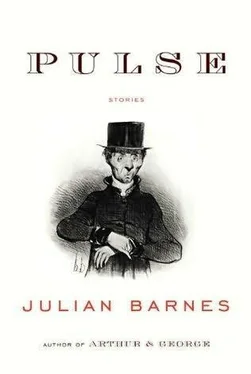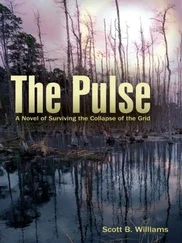
Copyright © Julian Barnes 2011
‘East Wind’, ‘Trespass’, ‘The Limner’ and ‘Complicity’ first appeared in The New Yorker ; ‘At Phil and Joanna’s 1: 60/40’ and ‘Sleeping with John Updike’ in the Guardian ; ‘At Phil and Joanna’s 2: Marmalade’ in the Sunday Times ; ‘Harmony’ in Granta . ‘Marriage Lines’ began as a radio commission for Alan Howard’s voice in 2007, and was later published by Granta .
THE PREVIOUS NOVEMBER, a row of wooden beach huts, their paintwork lifted and flaked by the hard east wind, had burnt to the ground. The fire brigade came from twelve miles away, and had nothing to do by the time it arrived. Yobs on Rampage, the local paper decided; though no culprit was ever found. An architect from a more fashionable part of the coastline told the regional TV news that the huts were part of the town’s social heritage, and must be rebuilt. The council announced that it would consider all options, but since then had done nothing.
Vernon had moved to the town only a few months before, and had no feelings about the beach huts. If anything, their disappearance improved the view from The Right Plaice, where he sometimes had lunch. From a window table he now looked out across a strip of concrete to damp shingle, a bored sky and a lifeless sea. That was the east coast: for months on end you got bits of bad weather and lots of no weather. This was fine by him: he’d moved here to have no weather in his life.
‘You are done?’
He didn’t look up at the waitress. ‘All the way from the Urals,’ he said, still gazing at the long, flat sea.
‘Pardon?’
‘Nothing between here and the Urals. That’s where the wind comes from. Nothing to stop it. Straight across all those countries.’ Cold enough to freeze your knob off, he might have added in other circumstances.
‘ Oorals ,’ she repeated. As he caught the accent, he looked up at her. A broad face, streaked hair, chunky body, and not doing any waitressy number in hope of a bigger tip. Must be one of those Eastern Europeans who were all over the country nowadays. Building trade, pubs and restaurants, fruit picking. Came over here in vans and coaches, lived in rabbit warrens, made themselves a bit of money. Some stayed, some went home. Vernon didn’t mind one way or the other. That’s what he found more often than not these days: he didn’t mind one way or the other.
‘Are you from one of them?’
‘One of what?’
‘One of those countries. Between here and the Urals.’
‘ Oorals . Yes, perhaps.’
That was an odd answer, he thought. Or maybe her sense of geography wasn’t so strong.
‘Fancy a swim?’
‘A swim?’
‘Yes, you know. Swim. Splash splash, front crawl, breast stroke.’
‘No swim.’
‘Fine,’ he said. He hadn’t meant it anyway. ‘Bill, please.’
As he waited, he looked back across the concrete to the damp shingle. A beach hut had recently sold for twenty grand. Or was it thirty? Somewhere down on the south coast. Spiralling house prices, the market going mad: that’s what the papers said. Not that it touched this part of the country, or the property he dealt in. The market had bottomed out here long ago, the graph as horizontal as the sea. Old people died, you sold their flats and houses to people who in their turn would get old in them and then die. That was a lot of his trade. The town wasn’t fashionable, never had been: Londoners carried on up the A12 to somewhere pricier. Fine by him. He’d lived in London all his life until the divorce. Now he had a quiet job, a rented flat, and saw the kids every other weekend. When they got older, they’d probably be bored with this place and start acting the little snobs. But for the moment they liked the sea, throwing pebbles into it, eating chips.
When she brought the bill, he said, ‘We could run away together and live in a beach hut.’
‘I do not think,’ she replied, shaking her head, as if she assumed he meant it. Oh well, the old English sense of humour, takes a while for people to get used to it.
He had a few rentals to attend to – changes of tenancy, redecoration, damp problems – and then a sale up the coast, so he didn’t return to The Right Plaice for a few weeks. He ate his haddock and mushies, and read the paper. There was some town in Lincolnshire which was suddenly half Polish there’d been so many immigrants. Nowadays, more Catholics went to church on Sundays than Anglicans, they were saying, what with all these Eastern Europeans. He didn’t mind one way or the other. Actually, he liked the Poles he’d met – brickies, plasterers, electricians. Good workers, well trained, did what they said, trustworthy. It was time the good old British building trade had a kick up the arse, Vernon thought.
The sun was out that day, slanting low across the sea, annoying his eyes. Late March, and bits of spring were getting even to this part of the coast.
‘How about that swim, then?’ he asked as she brought the bill.
‘Oh no. No swim.’
‘I’m guessing you might be Polish.’
‘My name is Andrea,’ she replied.
‘Not that I mind whether you’re Polish or not.’
‘I do not also.’
The thing was, he’d never been much good at flirting; never quite said the right thing. And since the divorce, he’d got worse at it, if that was possible, because his heart wasn’t in it. Where was his heart? Question for another day. Today’s subject: flirting. He knew all too well the look in a woman’s eye when you didn’t get it right. Where’s he coming from, the look said. Anyway, it took two to flirt. And maybe he was getting too old for it. Thirty-seven, father of two, Gary (8) and Melanie (5). That’s how the papers would put it if he was washed up on the coast some morning.
‘I’m an estate agent,’ he said. That was another line which often hampered flirting.
‘What is this?’
‘I sell houses. And flats. And we do rentals. Rooms, flats, houses.’
‘Is it interesting?’
‘It’s a living.’
‘We all need living.’
He suddenly thought: no, you can’t flirt either. Maybe you can flirt in your own language, but you can’t do it in English, so we’re even. He also thought: she looks sturdy. Maybe I need someone sturdy. She might be my age, for all I know. Not that he minded one way or the other. He wasn’t going to ask her out.
He asked her out. There wasn’t much choice of ‘out’ in this town. One cinema, a few pubs, and the couple of other restaurants where she didn’t work. Apart from that, there was bingo for the old people whose flats he would sell after they were dead, and a club where some half-hearted goths loitered. Kids drove into Colchester on a Friday night and bought enough drugs to see them through the weekend. No wonder they burnt down the beach huts.
He liked her at first for what she wasn’t. She wasn’t flirty, she wasn’t gabby, she wasn’t pushy. She didn’t mind that he was an estate agent, or that he was divorced with two kids. Other women had taken a quick look and said: no. He reckoned women were more attracted to men who were still in a marriage, however fucked up it was, than to ones picking up the pieces afterwards. Not surprising really. But Andrea didn’t mind all that. Didn’t ask questions much. Didn’t answer them either, for that matter. The first time they kissed, he thought of asking if she was really Polish, but then he forgot.
Читать дальше












